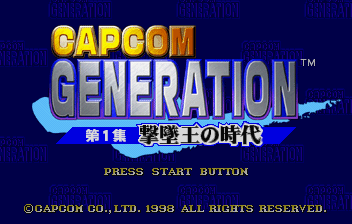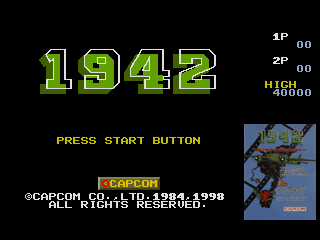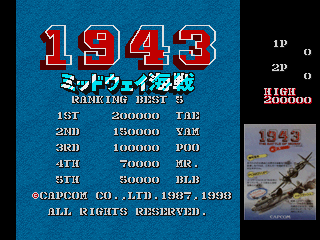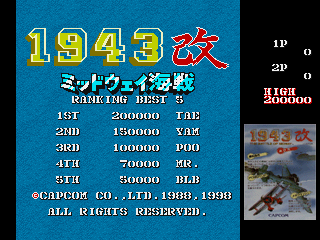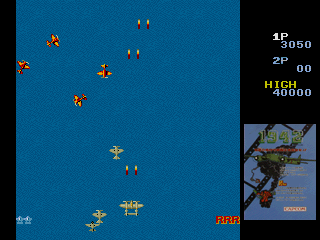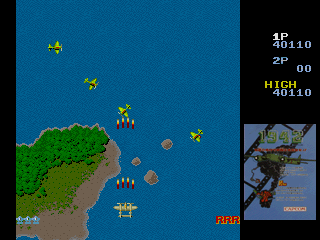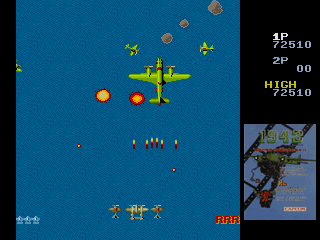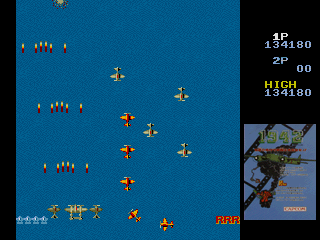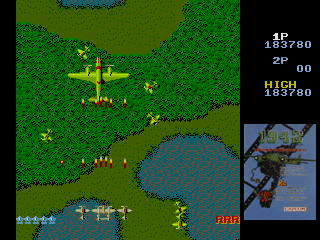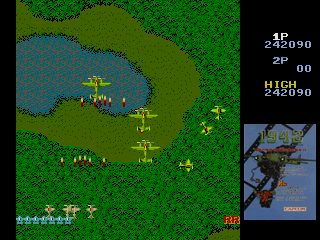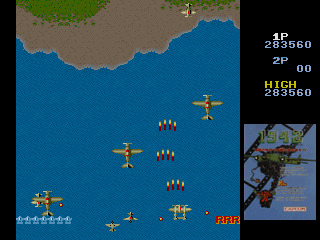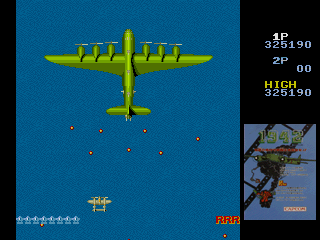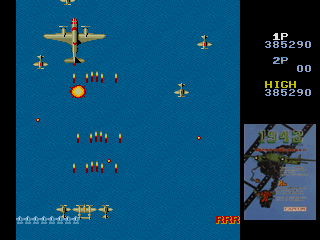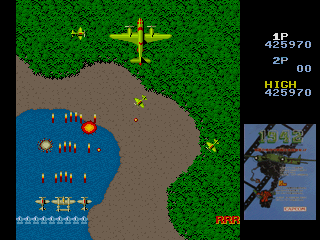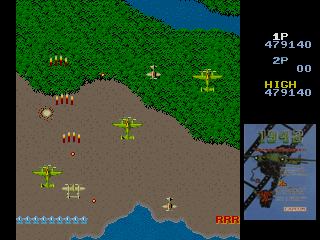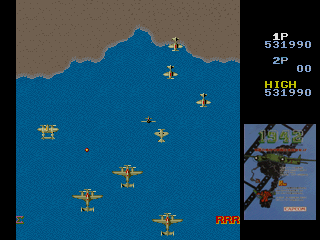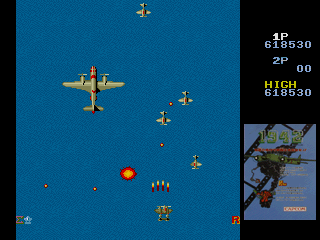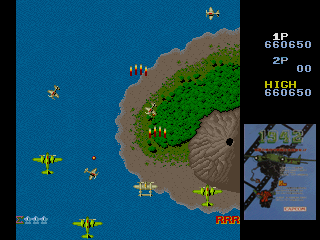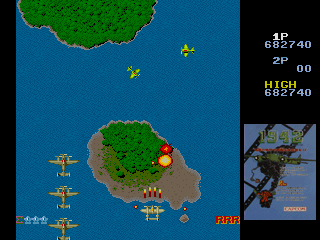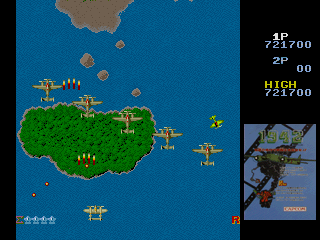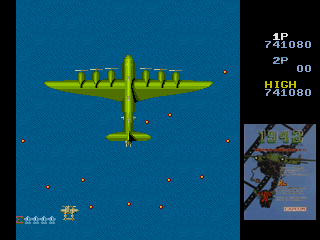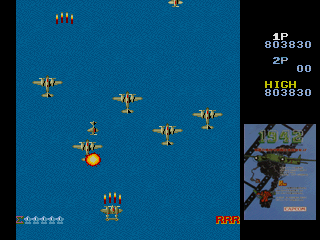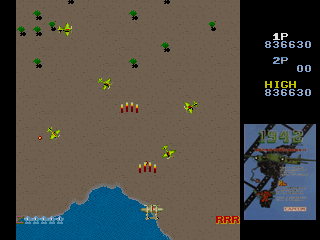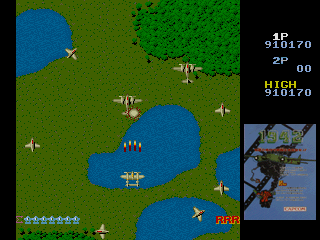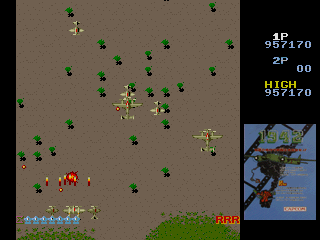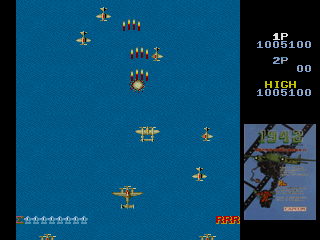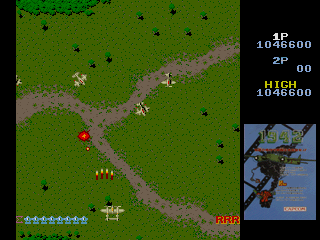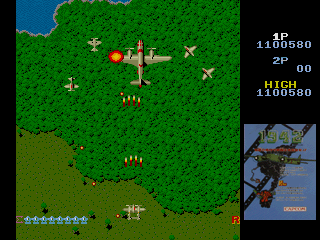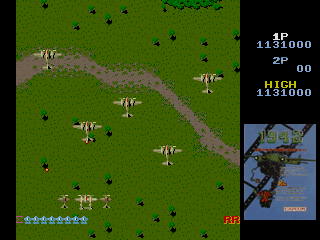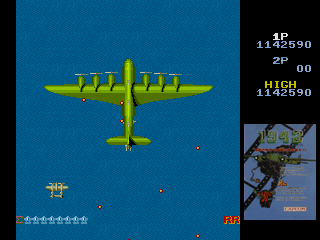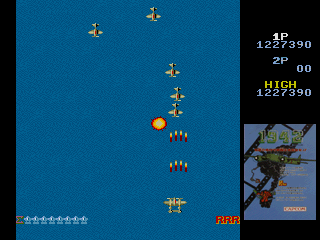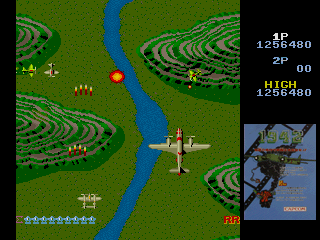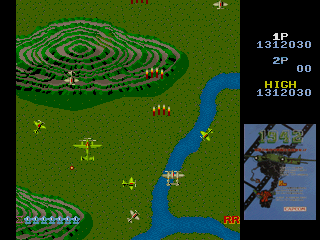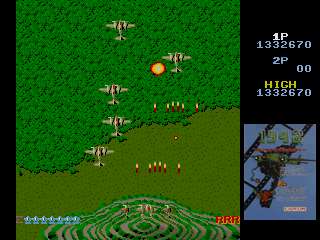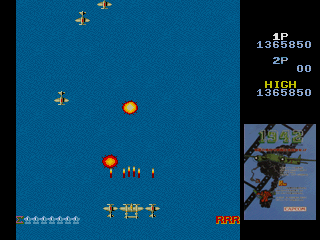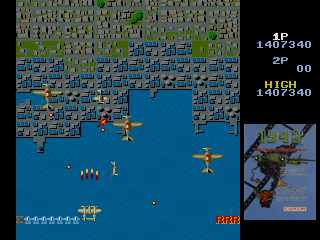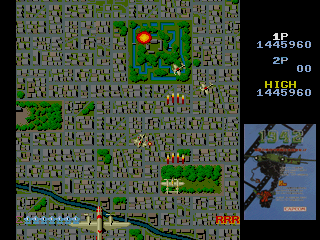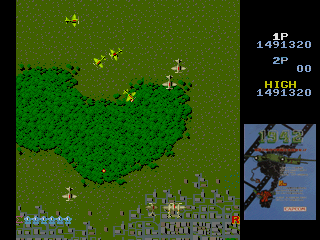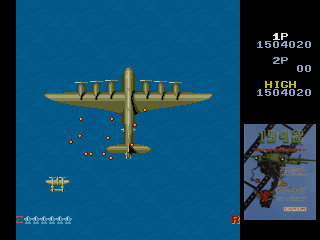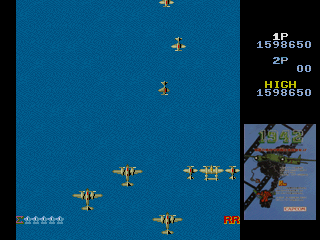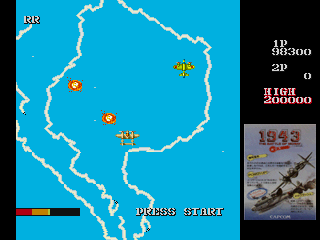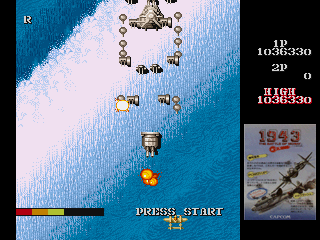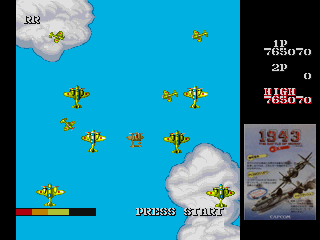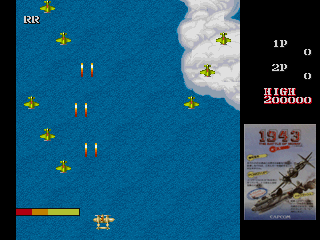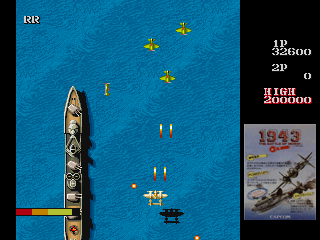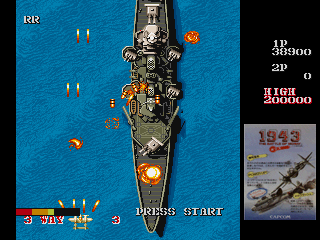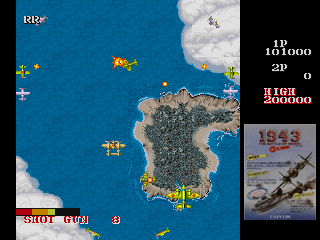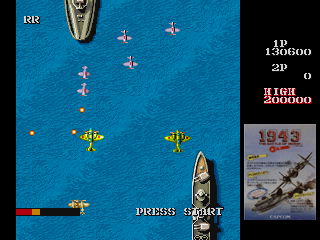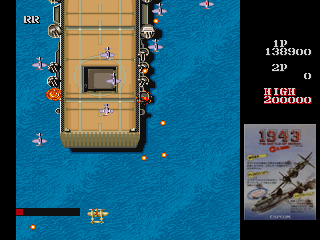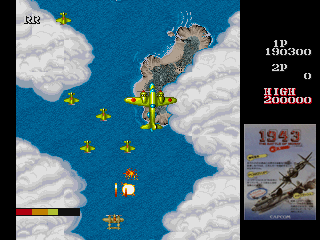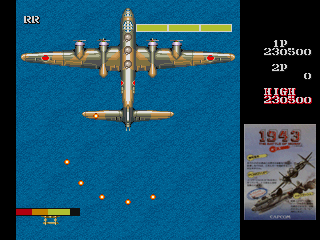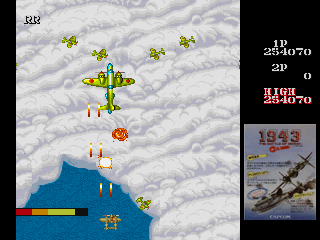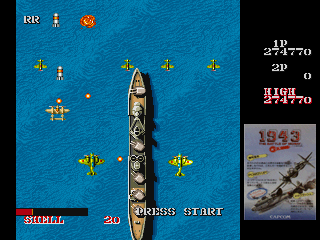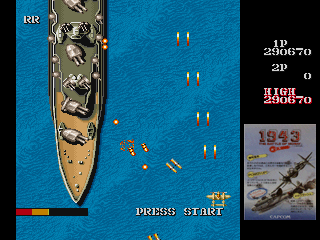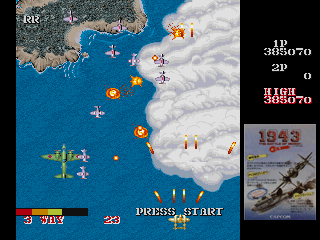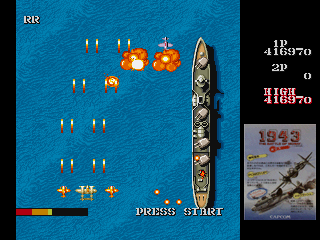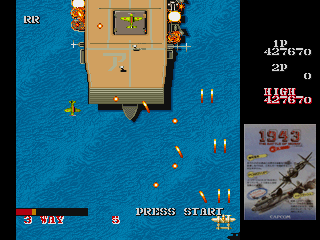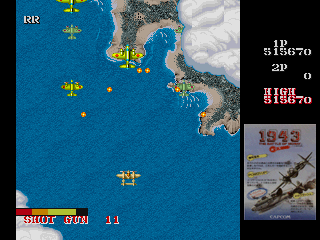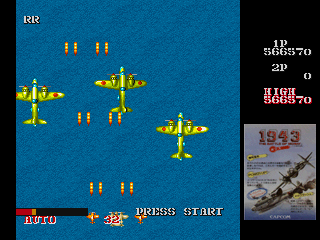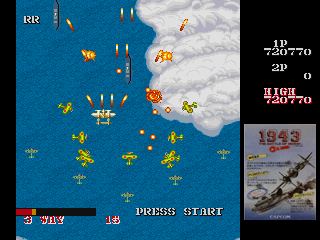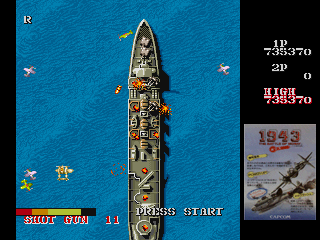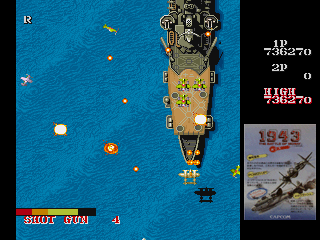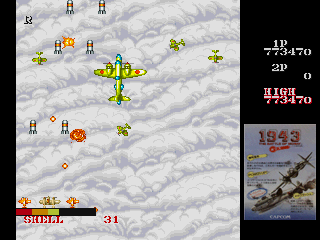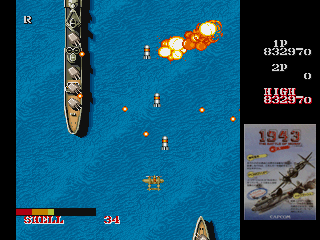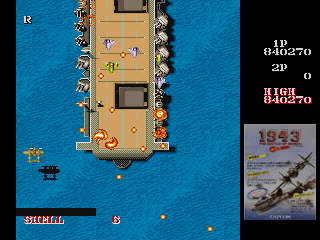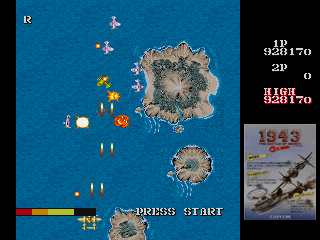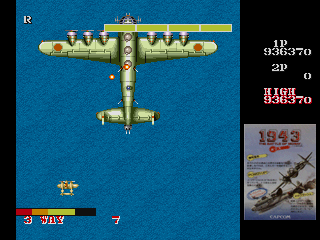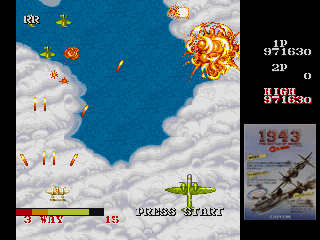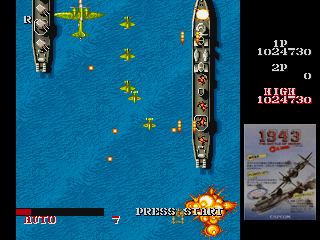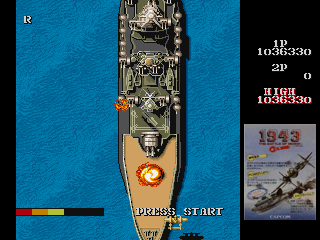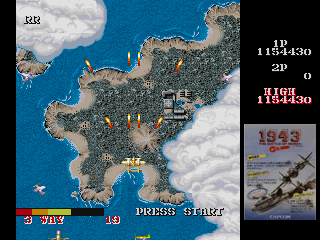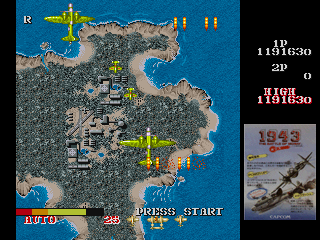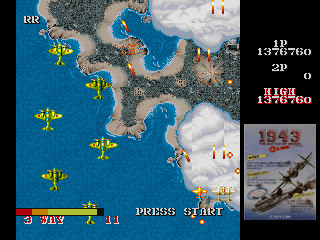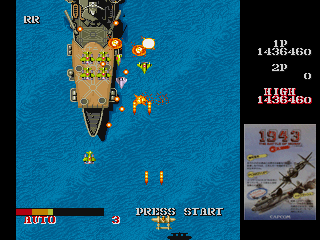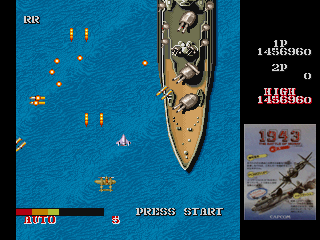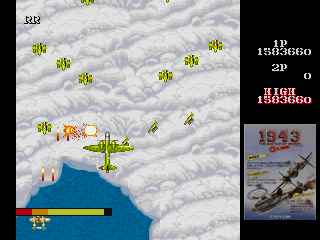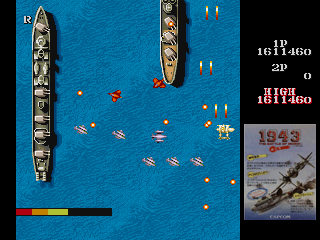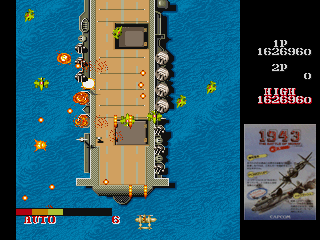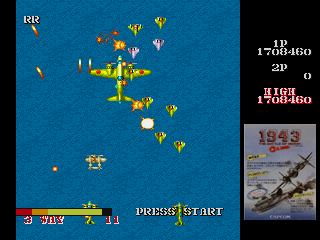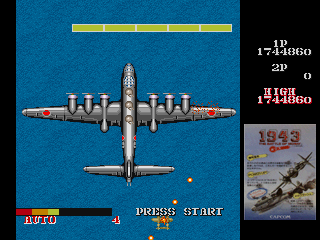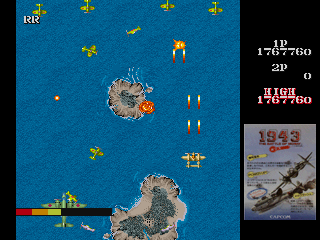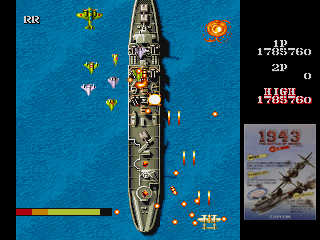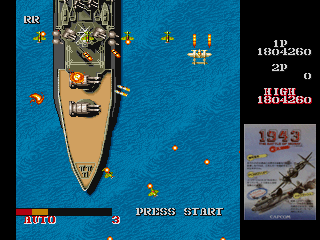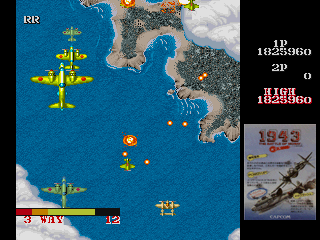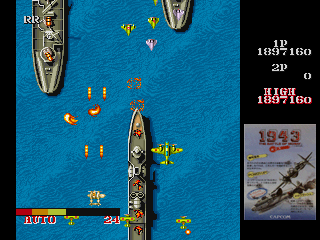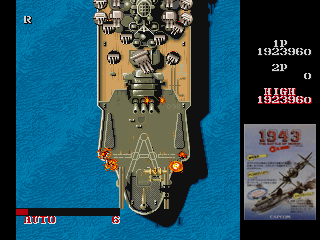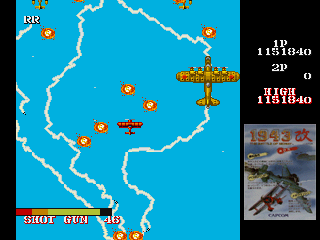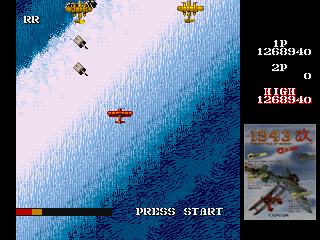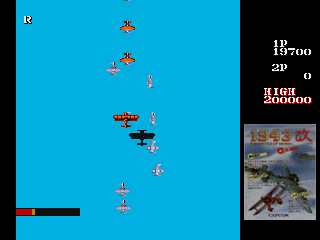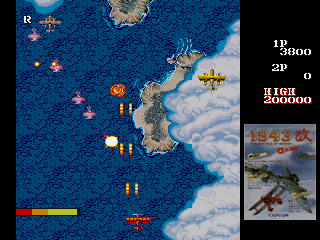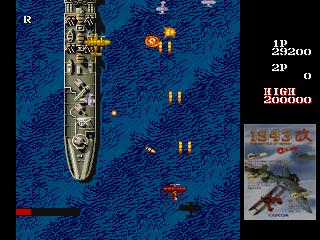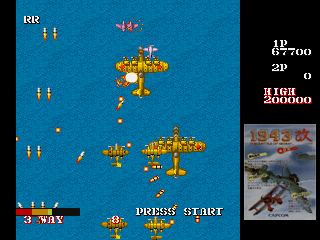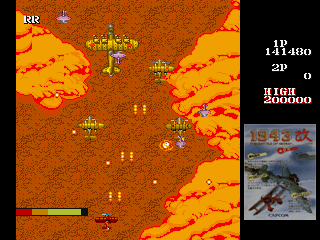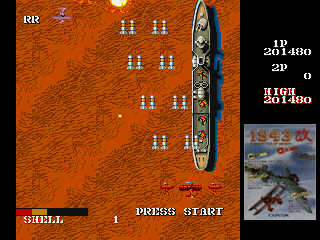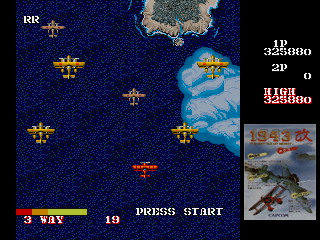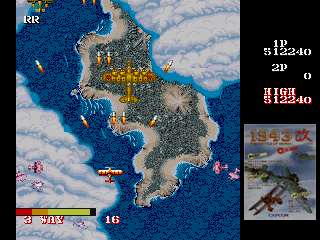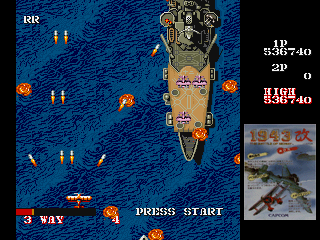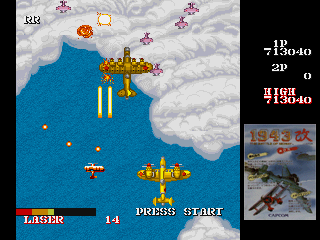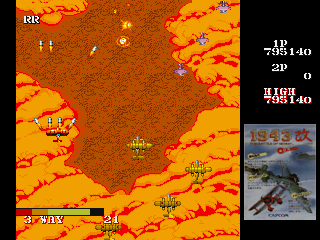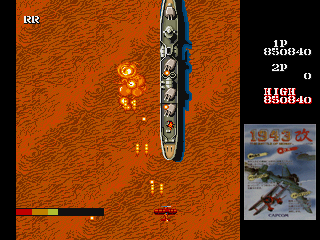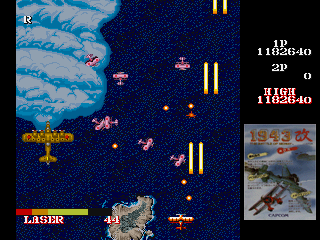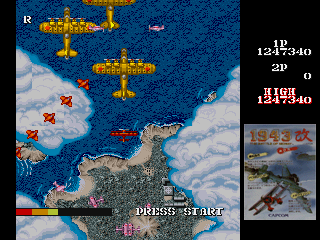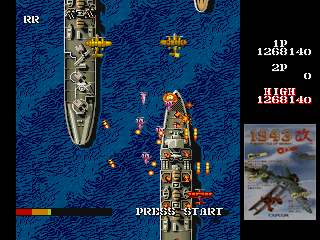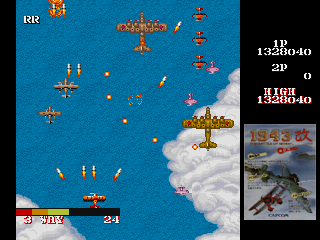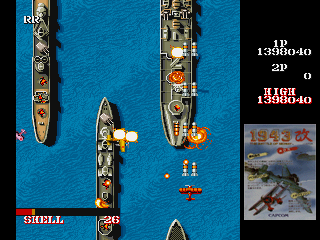Capcom Generation: Dai 1 Shuu Gekitsuiou no Jidai
From Sega Retro
| ||||||||||
| Capcom Generation: Dai 1 Shuu Gekitsuiou no Jidai | ||||||||||
|---|---|---|---|---|---|---|---|---|---|---|
| System(s): Sega Saturn | ||||||||||
| Publisher: Capcom | ||||||||||
| Developer: Capcom | ||||||||||
| Original system(s): Capcom 1942 hardware, Capcom 1943 hardware | ||||||||||
| Game total: 3 | ||||||||||
| Sound driver: SCSP (1 track) | ||||||||||
| Genre: Compilation, Shooting[1][2] | ||||||||||
| Number of players: 1-2 | ||||||||||
| ||||||||||
|
Capcom Generation: Dai 1 Shuu Gekitsuiou no Jidai (カプコンジェネレーション第1集 撃墜王の時代, "The Age of Flying Aces") is the first of five compilations for the Sega Saturn (and PlayStation) developed by Capcom.
The first volume focuses on the 194X series of vertical shoot-'em-ups set in World War II.
Contents
Games included
- 1942
- 1943
- 1943 Kai (1943改)
Every game has a "Collection" with artwork (including promotional art and concept art), information, and game tips. Options and high scores can be saved to the Saturn's internal memory.
Gameplay
1942
1942 is a vertically scrolling shoot-'em-up, originally released in 1984, and the first game in the 194X series. It is set in the Pacific Theater of World War II. The game was designed to appeal to Western audiences, so despite being created by Japanese developers, the player commands an American P-38 Lightning, dubbed the "Super Ace," and must travel from Midway to Tokyo to destroy the Japanese air fleet. The player must shoot down enemy planes and avoid enemy fire through 32 stages, which take place primarily over the Pacific Ocean and islands and end by landing on an aircraft carrier. There is a two-player mode where players take turns.
The plane moves in any direction using the D-Pad. It shoots with ![]() or
or ![]() , which can be held for continuous fire. There are two rapid-fire buttons that shoot faster,
, which can be held for continuous fire. There are two rapid-fire buttons that shoot faster, ![]() (low speed) or
(low speed) or ![]() (high speed). The plane's weapon can be upgraded once to fire a wider shot, and the player can obtain two smaller escort fighters that supplement its fire with their own. The plane can perform an evasive roll with
(high speed). The plane's weapon can be upgraded once to fire a wider shot, and the player can obtain two smaller escort fighters that supplement its fire with their own. The plane can perform an evasive roll with ![]() that causes it quickly loop out of the playfield, which can be used to avoid enemy fire or to fly over enemy planes. This can only be done a maximum of three times per stage.
that causes it quickly loop out of the playfield, which can be used to avoid enemy fire or to fly over enemy planes. This can only be done a maximum of three times per stage.
The plane is downed if it takes a single hit from enemy fire or collides with another aircraft, which costs a life. The plane respawns at a checkpoint without any acquired power-ups. Extends are given at 20,000 and 80,000 points, then every 80,000 points after that. The game ends if the player runs out of lives. In addition to the high score, the game also keeps track of the ratio of enemy fighters shot down. Players are awarded bonus points for finishing the stage with a higher ratio and for unused rolls.
There are four difficulty levels, and the player can change the points thresholds for earning extra lives or toggle continues. Since the original game uses a vertical aspect ratio, there are three screen modes: Type 1 interpolates the image to fit into the height of the Saturn's video mode, Type 2 (the default) crops the playfield to fit the screen, and Type 3 preserves the vertical aspect ratio (but requires the player to rotate the monitor).
Items
Destroying a formation of red enemy planes awards a power-up.
| Doubles the number of shots fired by the plane from two to four at a time. | |
| Adds two side fighters that follow the plane and fire alongside it. The fighters can be destroyed if they are hit by enemies. Hitting an enemy with a fighter destroys both the enemy and the fighter. The fighters depart for boss fights. | |
| Suppresses enemy fire for 15 seconds. | |
| Destroys all on-screen enemies. | |
| Gives the player another use of the loop ability (which is not carried over to the next stage if unused), up to a maximum of 4*. | |
| Gives the player an extend. | |
| Awards 1,000 bonus points. | |
| Yashichi (ヤシチ) | |
| Awards 5,000 bonus points. These are dropped by green planes with erratic flight patterns. This symbol occurs frequently as a bonus item in Capcom games. |
Stages
Midway
Marshall
Attu
Rabaul
Leyte
Saipan
Iwo Jima
Okinawa
1943
1943 is first follow-up to 1942, originally released in 1987. Like its predecessor, it is a vertically scrolling shoot-'em-up set in the Pacific Theater of World War II, off the coast of the Midway Atoll. The game adds a more sophisticated power-up system and simultaneous two-player play. The player assumes the role of a U.S. Navy pilot, again flying a P-38 Lightning, and battles Imperial Japanese naval aerial forces, culminating in a final fight against the battleship Yamato. The game supports one or two players simultaneously, and a second player can join a game in progress by pressing START on a second control pad.
There are two types of stage, aerial and naval. Every round starts high in the sky, above the clouds, fighting solely aerial enemies. If the mission target is a squadron of multiple strategic bombers or a single heavy bomber, the round ends after this first stage. Otherwise, if the mission target is a battleship or an aircraft carrier, the plane descends and continues the battle in a second stage, lower and close to the ocean, against a mix of enemy aircraft and naval vessels. In the maritime battles, the player must destroy the mission target with at least a 70% destruction rate, or else the stage is repeated again. If the player fails to attain a 70% destruction rate on the second attempt, the mission is failed and the player moves on to the next round.
The plane moves in any direction using the D-Pad. It shoots with ![]() or
or ![]() , which can be held for continuous fire. There are two rapid-fire buttons that shoot faster,
, which can be held for continuous fire. There are two rapid-fire buttons that shoot faster, ![]() (low speed) or
(low speed) or ![]() (high speed). The plane's weapon can be upgraded to any of six different special weapons by collecting power-ups, though these enhanced effects only last a limited time unless another power-up is picked up. The plane can fly around in a loop with
(high speed). The plane's weapon can be upgraded to any of six different special weapons by collecting power-ups, though these enhanced effects only last a limited time unless another power-up is picked up. The plane can fly around in a loop with ![]() , which is an evasive maneuver that can be used to escape dangerous situations. This can only be done two times per round.
, which is an evasive maneuver that can be used to escape dangerous situations. This can only be done two times per round.
The plane has a fuel gauge, which slowly drains during gameplay, replacing the life system of the previous game. Getting hit by enemies also reduces the gauge, and the plane is destroyed, ending the game, if it is hit when the gauge is empty. Power-ups can be collected that refuel the plane. The plane has a special "Mega Crash" attack that destroys every enemy on the screen at once with ![]() , but this costs fuel to use. There are three different Mega Crash attacks, depending on the type of stage. Players are awarded bonus points for finishing the round with more fuel remaining and for unused rolls and have some fuel replenished. The maximum fuel capacity increases every three rounds completed.
, but this costs fuel to use. There are three different Mega Crash attacks, depending on the type of stage. Players are awarded bonus points for finishing the round with more fuel remaining and for unused rolls and have some fuel replenished. The maximum fuel capacity increases every three rounds completed.
There are eight difficulty levels, and the player can toggle continues (but the last round cannot be continued). Since the original game uses a vertical aspect ratio, there are three screen modes: Type 1 interpolates the image to fit into the height of the Saturn's video mode, Type 2 (the default) crops the playfield to fit the screen, and Type 3 preserves the vertical aspect ratio (but requires the player to rotate the monitor).
Mega Crash
Mega Crash abilities cost fuel to use. The ability used depends on the stage and the circumstances.
| Lightning (稲妻) | |
|---|---|
| Calls down strikes of lightning that destroy small enemy aircraft and neutralize enemy projectiles. This ability is used during the stages with only aerial enemies. | |
| Tsunami (津波) | |
| Summons a giant ocean wave that destroys small enemy aircraft, damages ships, and neutralizes enemy projectiles. It also pauses the screen scrolling until the waves subside. This ability is used during the stages with naval enemies. | |
| Kamaitachi (カマイタチ) | |
| Causes the sky to flash, which neutralizes enemy projectiles and suppresses enemy fire for a duration. This ability is automatically used on either aerial or naval stages instead of the other abilities when an enemy projectile is close to the plane. |
Items
Destroying a formation of red enemy planes awards a power-up.
Special weapons can have their time increased up to a maximum of 64 seconds.
| POW | |
|---|---|
| Replenishes 8 units of fuel. This item can be shot to change it to a weapon power-up: it cycles from POW to Shot Gun to POW to 3-Way to POW to Auto to POW to Shell. This sequence repeats two more times, then it turns into an Energy Tank. | |
| Shot Gun | |
| Arms the plane with the Shot Gun weapon or adds another 20 seconds of use if already equipped. This weapon is a six-way spreadshot that fires relatively slowly but can neutralize enemy projectiles. It can be upgraded to have longer range by collecting another Shot Gun item when it is already equipped. | |
| 3-Way | |
| Arms the plane with the 3-Way weapon or adds another 20 seconds of use if already equipped. This weapon is a three-way spreadshot. | |
| Auto | |
| Arms the plane with the Auto weapon or adds another 20 seconds of use if already equipped. This weapon is similar to the regular weapon but fires much more quickly. | |
| Shell | |
| Arms the plane with the Shell weapon or adds another 20 seconds of use if already equipped. This weapon shoots two parallel shells, similar to the regular weapon but higher damage. | |
| Side Fighter | |
| Adds two side fighters that follow the plane and fire alongside it. The fighters can sustain a few hits from enemies before they are destroyed. | |
| Energy Tank | |
| Replenishes 24 units of fuel. |
Hidden
These items appear more seldomly and under special circumstances.
| Yashichi (ヤシチ) | |
|---|---|
| Fully replenishes the plane's fuel. This symbol occurs frequently as a bonus item in Capcom games. | |
| Bamboo Shoot | |
| Awards 2,000 bonus points. This item is found by flying over certain spots in the clouds in some stages. | |
| Sakichi (佐吉) | |
| Awards 5,000 bonus points and increases the weapon time for the currently equipped special weapon (if any) to 64 seconds. This item appears after shooting down a special plane that appears after shooting down 200 enemy planes. | |
| Strawberry | |
| Awards 10,000 bonus points. This item is found by shooting at the end of the ships that appear at the end of an aerial stage (before a naval stage). | |
| Barrel | |
| Awards 10,000 bonus points. This item is found by shooting at certain spots on the water in the naval stages. | |
| Holstein (ホルスタイン) | |
| Awards 20,000 bonus points. This item is found by shooting at certain spots on some stages. | |
| Dragonfly | |
| Shoot for 10,000 bonus points. This item flies across the screen sometimes. | |
| Mobi-chan (モビちゃん) | |
| Shoot for 100,000 bonus points. This item sometimes appears out of destroyed battleships under unknown conditions. | |
| Lucky Cat (招き猫) | |
| Arms the plane with the Laser weapon. This weapon shoots long, piercing laser beams. This item appears randomly under unknown circumstances. |
Rounds
| Round 1 | |
|---|---|
|
Boss: Tone | |
| Round 2 | |
|
Boss: Kaga | |
| Round 3 | |
|
Boss: Ayako | |
| Round 4 | |
|
Boss: Fusou | |
| Round 5 | |
|
Boss: Akagi | |
| Round 6 | |
|
Boss: Daihiryuu | |
| Round 7 | |
|
Boss: Ise | |
| Round 8 | |
|
Boss: Hiryuu | |
| Round 9 | |
|
Boss: Ayako | |
| Round 10 | |
|
Boss: Mutsu | |
| Round 11 | |
|
Boss: Daihiryuu | |
| Round 12 | |
|
Boss: Yamashiro | |
| Round 13 | |
|
Boss: Souryuu | |
| Round 14 | |
|
Boss: Ayako | |
| Round 15 | |
|
Boss: Nagato | |
| Round 16 | |
|
Boss: Yamato | |
1943 Kai
1943 Kai was a revised version of 1943, originally released in 1987. It is largely identical to 1943 but has revised graphics, including substituting the series' iconic twin-boom Lockheed P-38 Lightning for a Boeing Stearman E75 biplane. Some of the special weapons have been reworked, the difficulty has been increased, the soundtrack has been redone, and the number of stages has been reduced to ten. The game supports one or two players simultaneously, and a second player can join a game in progress by pressing START on a second control pad.
As before, there are two types of stage: those that take place high in the sky, above the clouds, against solely aerial enemies, and those that take place lower and close to the ocean, against a mix of enemy aircraft and naval vessels. Each round ends with a fight against a formidable mission target: a massive bomber in the aerial missions or a heavily armed battleship in the maritime missions. In either case, the player must destroy the mission target with at least a 70% destruction rate, or else the stage is repeated again. If the player fails to attain a 70% destruction rate on the second attempt, the mission is failed and the player moves on to the next round.
The plane moves in any direction using the D-Pad. It shoots with ![]() or
or ![]() , which can be held for continuous fire. There are two rapid-fire buttons that shoot faster,
, which can be held for continuous fire. There are two rapid-fire buttons that shoot faster, ![]() (low speed) or
(low speed) or ![]() (high speed). The plane's weapon can be upgraded to any of six different special weapons by collecting power-ups, though these enhanced effects only last a limited time unless another power-up is picked up. The plane can fly around in a loop with
(high speed). The plane's weapon can be upgraded to any of six different special weapons by collecting power-ups, though these enhanced effects only last a limited time unless another power-up is picked up. The plane can fly around in a loop with ![]() , which is an evasive maneuver that can be used to escape dangerous situations. This can only be done two times per round.
, which is an evasive maneuver that can be used to escape dangerous situations. This can only be done two times per round.
The plane has a fuel gauge, which slowly drains during gameplay, replacing the life system of the previous game. Getting hit by enemies also reduces the gauge, and the plane is destroyed, ending the game, if it is hit when the gauge is empty. Power-ups can be collected that refuel the plane. The plane has a special "Mega Crash" attack that destroys every enemy on the screen at once with ![]() , but this costs fuel to use. There are three different Mega Crash attacks, depending on the type of stage. Players are awarded bonus points for finishing the round with more fuel remaining and for unused rolls and have some fuel replenished. The maximum fuel capacity increases every three rounds completed.
, but this costs fuel to use. There are three different Mega Crash attacks, depending on the type of stage. Players are awarded bonus points for finishing the round with more fuel remaining and for unused rolls and have some fuel replenished. The maximum fuel capacity increases every three rounds completed.
There are eight difficulty levels, and the player can toggle continues (but the last round cannot be continued). Since the original game uses a vertical aspect ratio, there are three screen modes: Type 1 interpolates the image to fit into the height of the Saturn's video mode, Type 2 (the default) crops the playfield to fit the screen, and Type 3 preserves the vertical aspect ratio (but requires the player to rotate the monitor).
Mega Crash
Mega Crash abilities cost fuel to use. The ability used depends on the stage and the circumstances.
| Lightning (稲妻) | |
|---|---|
| Calls down strikes of lightning that destroy small enemy aircraft and neutralize enemy projectiles. This ability is used during the stages with only aerial enemies. | |
| Tsunami (津波) | |
| Summons a giant ocean wave that destroys small enemy aircraft, damages ships, and neutralizes enemy projectiles. It also pauses the screen scrolling until the waves subside. This ability is used during the stages with naval enemies. | |
| Kamaitachi (カマイタチ) | |
| Causes the sky to flash, which neutralizes enemy projectiles and suppresses enemy fire for a duration. This ability is automatically used on either aerial or naval stages instead of the other abilities when an enemy projectile is close to the plane. |
Items
Destroying a formation of red enemy planes awards a power-up.
Special weapons can have their time increased up to a maximum of 108 seconds.
| POW | |
|---|---|
| Replenishes 8 units of fuel. This item can be shot to change it to a weapon power-up: it cycles from POW to 3-Way to POW to Shell to POW to Laser to POW to Shot Gun. This sequence repeats two more times, then it turns into an Energy Tank. | |
| 3-Way | |
| Arms the plane with the 3-Way weapon or adds another 28 seconds of use if already equipped. This weapon is a three-way spreadshot. | |
| Shell | |
| Arms the plane with the Shell weapon or adds another 28 seconds of use if already equipped. This weapon shoots two parallel shells, similar to the regular weapon but higher damage. | |
| Laser | |
| Arms the plane with the Laser weapon or adds another 28 seconds of use if already equipped. This weapon shoots long, piercing laser beams. | |
| Shot Gun | |
| Arms the plane with the Shot Gun weapon or adds another 28 seconds of use if already equipped. This weapon is a five-way spreadshot of ring-shaped projectiles that can neutralize enemy projectiles. | |
| Side Fighter | |
| Adds two side fighters that follow the plane and fire alongside it. The fighters can sustain a few hits from enemies before they are destroyed. | |
| Energy Tank | |
| Replenishes 24 units of fuel. |
Hidden
These items appear more seldomly and under special circumstances.
| Yashichi (ヤシチ) | |
|---|---|
| Fully replenishes the plane's fuel. This symbol occurs frequently as a bonus item in Capcom games. | |
| Bamboo Shoot | |
| Awards 2,000 bonus points. This item is found by flying over certain spots in the clouds in some stages. | |
| Sakichi (佐吉) | |
| Awards 5,000 bonus points and increases the weapon time for the currently equipped special weapon (if any) to 108 seconds. This item appears after shooting down a special plane that appears after shooting down 200 enemy planes. | |
| Strawberry | |
| Awards 10,000 bonus points. This item is found by shooting at the end of the ships that appear at the end of an aerial stage (before a naval stage). | |
| Barrel | |
| Awards 10,000 bonus points. This item is found by shooting at certain spots on the water in the naval stages. | |
| Holstein (ホルスタイン) | |
| Awards 20,000 bonus points. This item is found by shooting at certain spots on some stages. | |
| Mobi-chan (モビちゃん) | |
| Shoot for 100,000 bonus points. This item sometimes appears out of destroyed battleships under unknown conditions. |
Rounds
| Round 1 | |
|---|---|
|
Boss: Kaga | |
| Round 2 | |
|
Boss: Ayako | |
| Round 3 | |
|
Boss: Akagi | |
| Round 4 | |
|
Boss: Daihiryuu | |
| Round 5 | |
|
Boss: Ise | |
| Round 6 | |
|
Boss: Ayako | |
| Round 7 | |
|
Boss: Yamashiro | |
| Round 8 | |
|
Boss: Ayako | |
| Round 9 | |
|
Boss: Nagato | |
| Round 10 | |
|
Boss: Yamato | |
History
Release
This is the first release in the Capcom Generation series. The Sega Saturn versions of these games were exclusively released in Japan, but the PlayStation versions of the first four volumes were also released in Europe as part of a bundle titled Capcom Generations (except for the German version, which omits the fourth volume).
Production credits
1943 and 1943 Kai
- Game Design: Poo & Dechikun
- Producer: Kihaji.O
- Character Design: Sato Chin, Miki Chan, Kawamovan, Aho no Sakata
- Sound & Music: Jungle Kumi
- Hard Ware: Panchi Kubozoo, Jumbo Saito
- Special Thanks: Shinshuudon, Kokusho Savuri, Nanno Yamauchi, Phazer Tae 250R, Piihvara Yumi, Jogging, New Face Ichigo
- Program: BLBON.
- Presented by: Capcom
Magazine articles
Promotional material
Physical scans
| Sega Retro Average | ||||||||||||||||||||||||||||||||||||||||||||
|---|---|---|---|---|---|---|---|---|---|---|---|---|---|---|---|---|---|---|---|---|---|---|---|---|---|---|---|---|---|---|---|---|---|---|---|---|---|---|---|---|---|---|---|---|
|
| 58 | |
|---|---|
| Based on 8 reviews | |
Technical information
References
NEC Retro has more information related to 1942
|
NEC Retro has more information related to 1943 Kai
|
- ↑ File:CapcomGeneration1 Saturn JP Box Back.jpg
- ↑ 2.0 2.1 https://sega.jp/history/hard/segasaturn/software_l.html#tab04 (Wayback Machine: 2019-12-07 02:59)
- ↑ Sega Saturn Magazine, "1998-25 (1998-09-11,18)" (JP; 1998-08-28), page 5
- ↑ File:1943 Saturn credits.pdf
- ↑ CD Consoles, "Novembre 1998" (FR; ), page 140
- ↑ Famitsu, "1998-09-04" (JP; 1998-08-21), page 1
- ↑ Joypad, "Octobre 1998" (FR; 1998-xx-xx), page 88
- ↑ Saturn Fan, "1998 No. 16" (JP; 1998-08-07), page 138
- ↑ Saturn Fan, "1998 No. 20" (JP; 1998-10-23), page 96
- ↑ Sega Saturn Magazine, "November 1998" (UK; 1998-10-xx), page 58
- ↑ Sega Saturn Magazine, "1998-24 (1998-08-21,28)" (JP; 1998-08-07), page 201
- ↑ Sega Saturn Magazine, "Readers rating final data" (JP; 2000-03), page 12
| Capcom Generation: Dai 1 Shuu Gekitsuiou no Jidai | |
|---|---|
|
Main page | Comparisons | Magazine articles | Reception | Technical information
| |
